Many content marketers still continue to build content around competitive keywords. But did you know you can improve your site architecture, domain authority, organic search traffic, and ranking when you implement a pillar and cluster strategy?
Google's algorithms, like E-E-A-T, are very much focused on valuable and expertise-driven content that's helpful for the searcher in meeting their search intent.
And pillar pages help you rank as they give you a platform to showcase your experience and expertise on the topic, which in turn, demonstrates authority and trustworthiness - all things Google likes.
I've compiled the best pillar pages examples; study these to help you establish topical authority and gain other SEO benefits.
What you will learn
- What pillar pages are and how they are a key ranking factor
- How these high-level articles benefit your content marketing and SEO strategies with a higher search ranking, more traffic, and a decreased bounce rate
- See great examples of pillar pages in action and how they use sticky tables, headings, content, multimedia, and links to illustrate topical authority
What are pillar pages?
Pillar pages, also called pillar posts, are comprehensive, high-level content pieces that give your website visitors a broad topic overview with links to related content. A pillar page is similar to a landing page or landing destination within your content hub, or content cluster, as it's about the main topic, product, service, or resource.
You internally link to all the other cluster pages from the pillar page, which is the central topic resource. To further optimize your internal linking strategy and boost organic traffic, every cluster page should contain an internal link to the pillar page (and to each other).
A recent study into the power of pillar pages revealed the following:
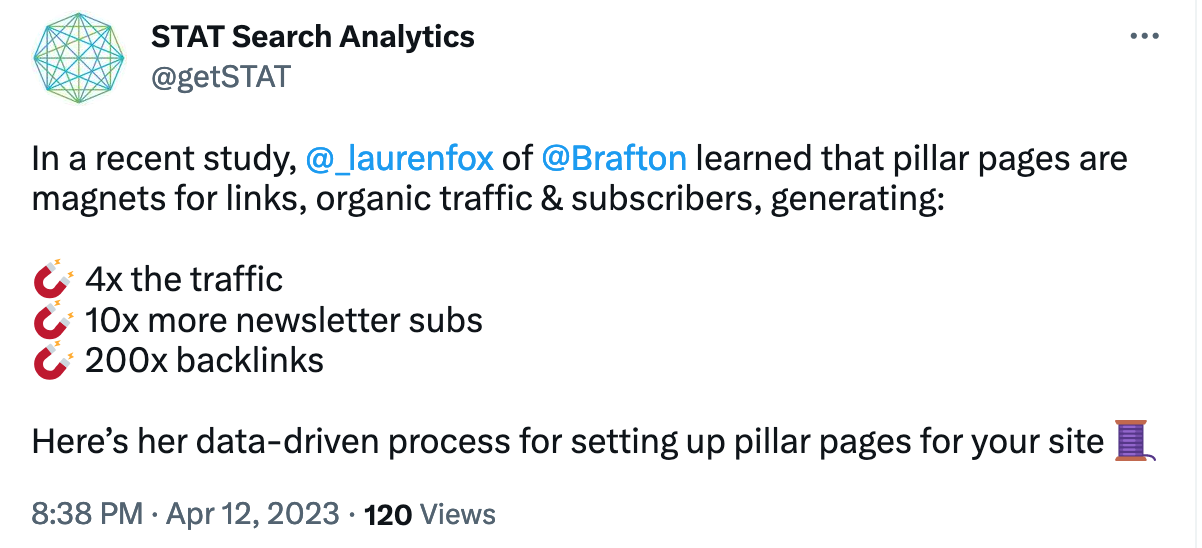
As such, pillar pages are an essential aspect of a successful digital marketing strategy as you build topic clusters that are conceptually relevant to establish topical authority - one of the key points of the E-E-A-T algorithm.
There are other benefits of implementing the topic cluster model, the hub and spoke strategy, the pillar page strategy, or cluster topic content strategy.
Having a content site devoted to core content hubs improves your rankability and web traffic as Google and other search engines better understand what your website is about as the search bot recognizes connections between pages with similar themes.
Here's an example of what pillar and cluster pages are if the broad topic is "What is a pillar page?"
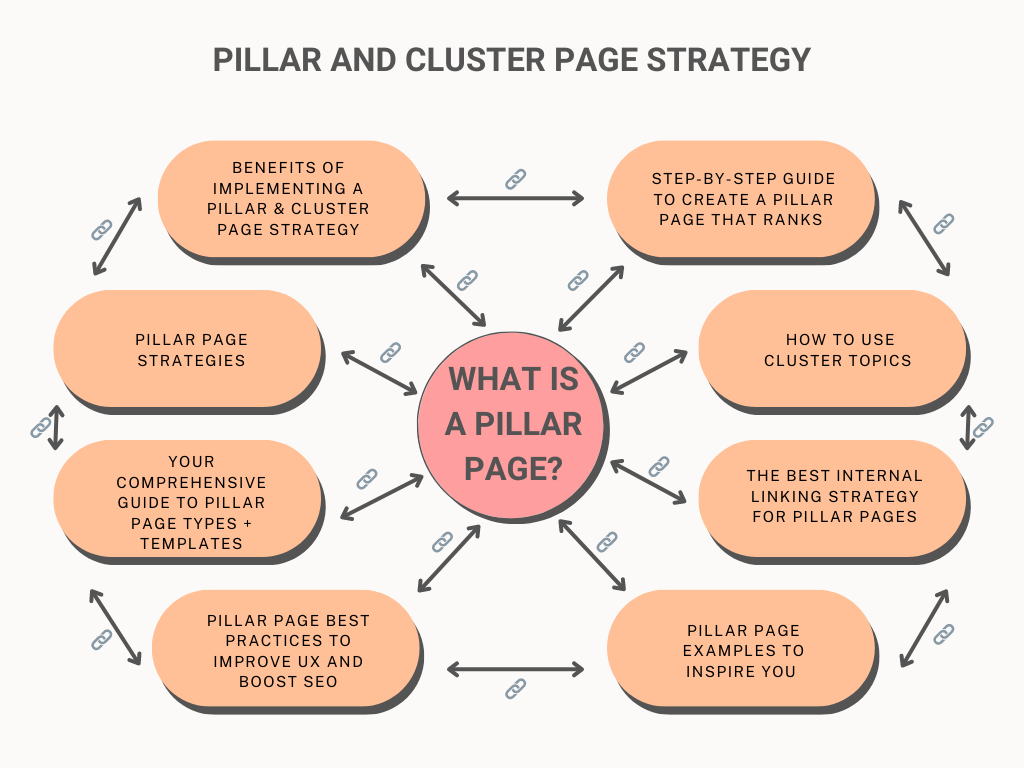
In this example, you have the three core components of a topic cluster or content hub:
- You have the pillar page - "What is a pillar page?" - in the middle.
- Then all the cluster topic pages are around the pillar page.
- Everything also links to each other: the pillar page links to the clusters, each cluster links to the pillar page topic, and every cluster links to each other.
Not all pillar pages look exactly the same. My example above is one pillar page type - a "What is X?" guide. Other types include:
- Resource pillar page
- Service or product pillar page
- How to guide
- 10x content pillar page (an article whose content is 10x better than what’s out there)
9 examples of pillar pages in SEO
Various elements must be present for a pillar page to be categorized as one. An excellent pillar page should:
- Be a go-to resource with a single page created around a particular topic with specific keywords
- Have multiple topic clusters with related pages it links to
- Have a table of contents
- Be optimized, digestible or skimmable, evergreen, shareable, concise, user-friendly, interactive, and in depth
Let's not keep you waiting any longer. Here are 9 examples of pillar pages that meet the criteria of an excellent pillar page:
Drip’s email marketing guide
Drip is an email marketing automation software company, so it makes perfect sense that they'll have a pillar page on email marketing. After all, nearly 60% of searchers use the internet to find information.
Type of pillar page: 10x content guide
Number of internal links: 54
Number of external links: 42
What makes this a pillar page?
Drip's page on email marketing is a comprehensive guide, covering cluster content related to different email examples by type, industry, and season (from thank you, abandoned cart, Easter, and holiday emails to emails for those in the B2B, travel agency, and e-commerce industries).
This type of landing page also looks at email marketing best practices, which is invaluable to readers.
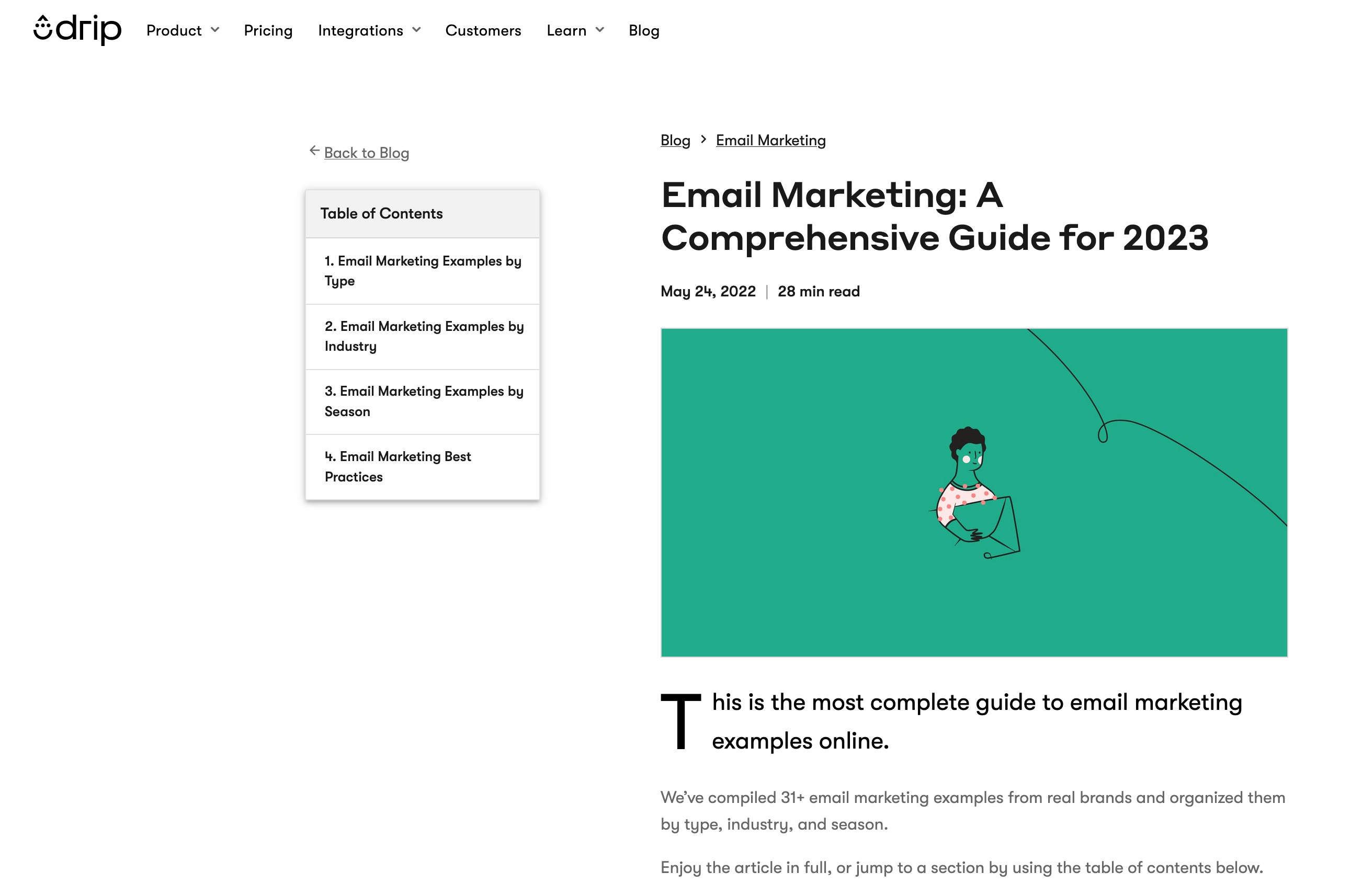
What do I love about it?
The pillar page is detailed with tons of examples that email marketers can use in their business. The page is long, but every email example has at least two real-life examples in the form of images and GIFs so readers can see the email in action, so to speak.
The table of contents floats on the left side (it's a sticky table) so you can jump ahead to a topic you are most interested in. However, I'd have liked a more detailed table, like a dropdown table, to get to a specific email example instead of scrolling through six to thirteen examples in each main category.
I also like the hot pink progress bar that gives you an idea of where you are on this pillar page.
Investopedia’s stock market for teens
Another good pillar page example is Investopedia's stock market for teens guide. Besides the fact that "teens" are part of the page's title, it's clear who is the target audience when you look at the language used.
Type of pillar page: Guide
Number of internal links: 18
Number of external links: 9
What makes this a pillar page?
Investopedia's pillar content page is definitely the ultimate guide on everything about the stock market for young adults. The page features a table of contents, key takeaways section, information in bite-sizes with bullets, info boxes, and key definitions.
The pillar page even includes games to teach teens about the stock market and books if they want to learn more.
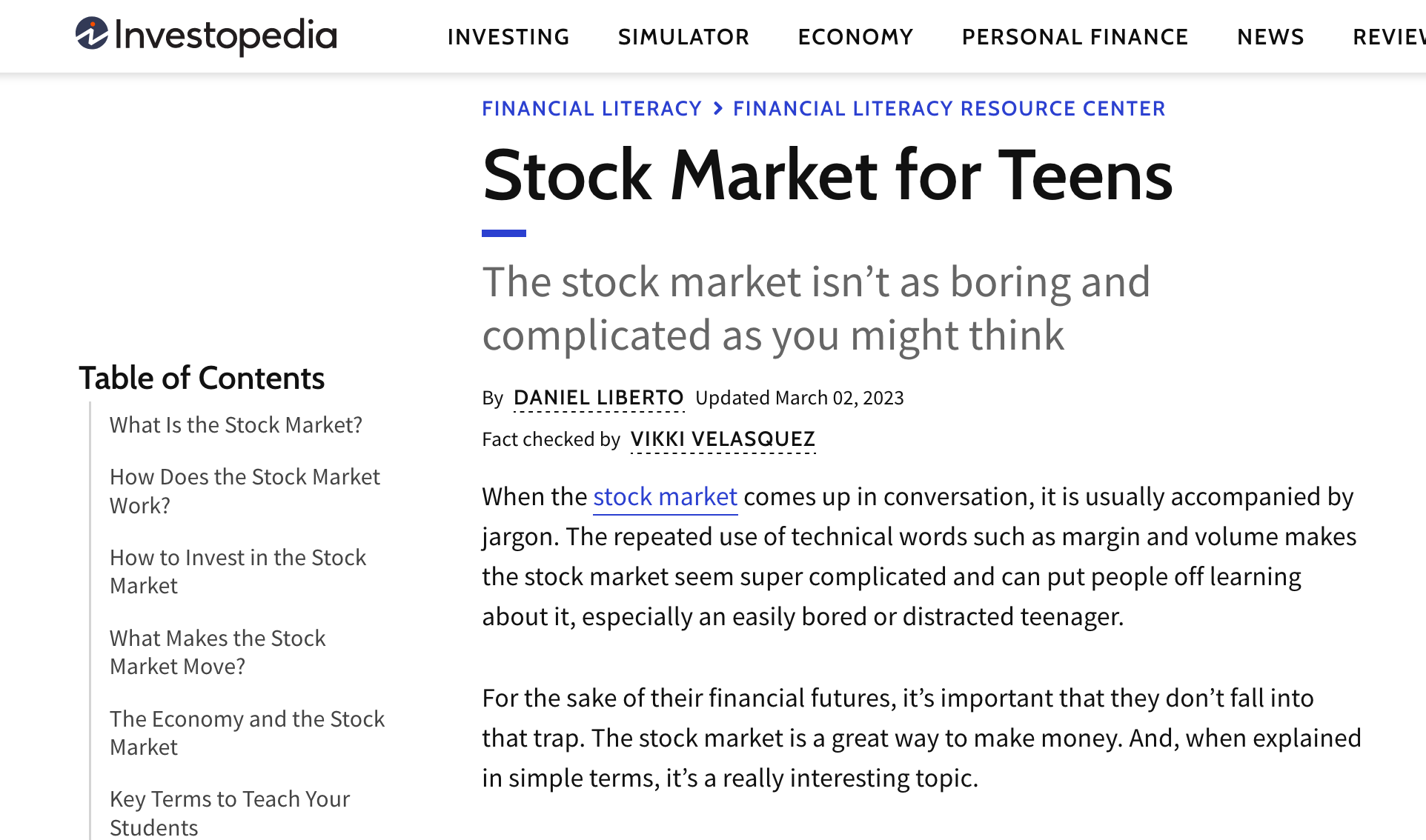
What do I love about it?
I like how Investopedia's entire page of content is geared toward teens. This pillar page is part of their "Future First: Money Lessons for Teens" series, which comprises 29 guides about money matters.
While no images are used, I didn't feel like the article was too long because sections like the key takeaways, must-know stock terms, and bullets made the text scannable and digestible. Overall, the content is well-organized and is #1 in the search rankings for various keywords.
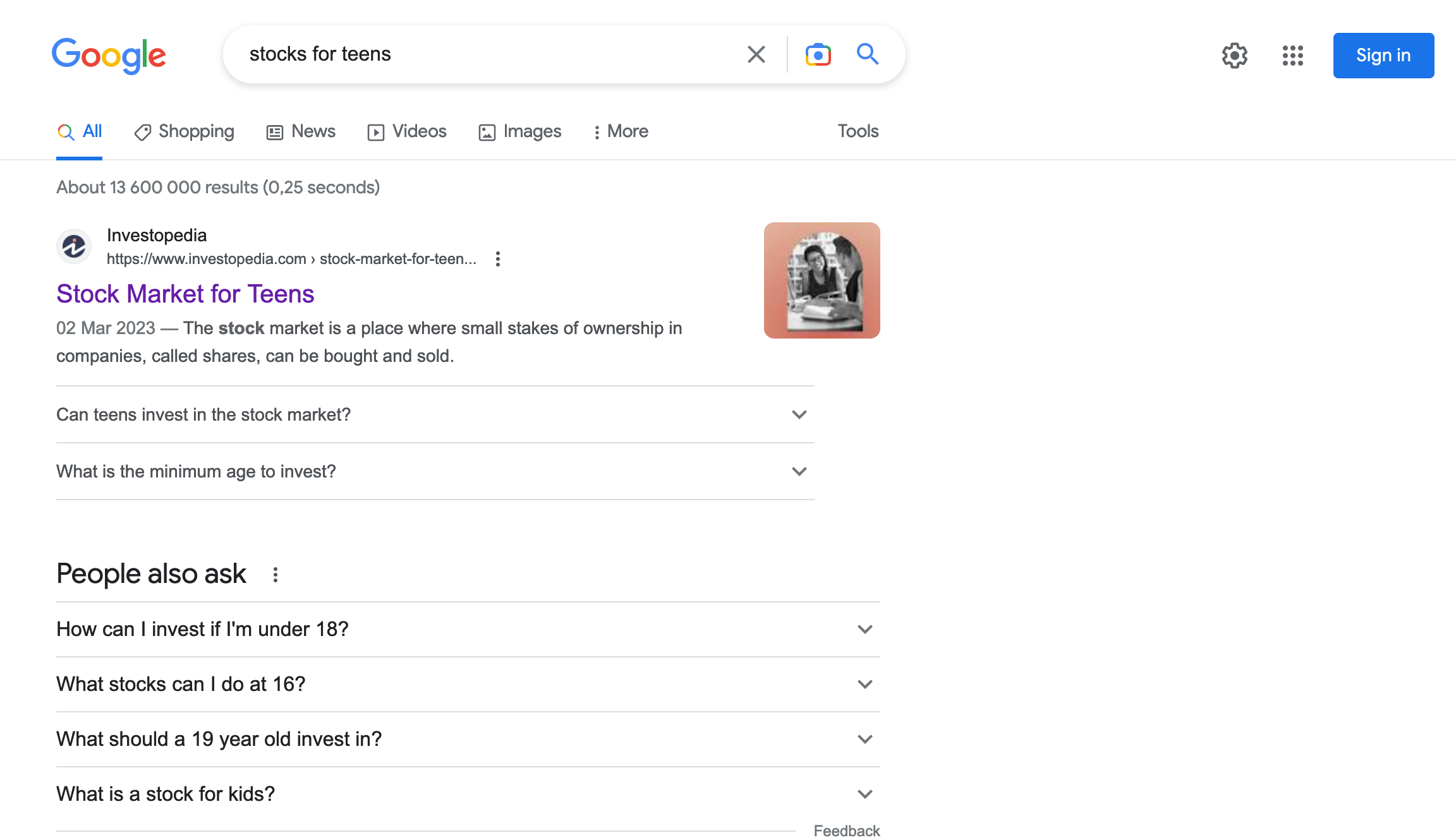
Wirecutter’s camera guide
The NY Times Wirecutter's camera guide provides in depth content about cameras so readers can find which one suits their needs best. According to Smart Insights, one of the main reasons (at 43.4%) people use the internet is to research products and brands, so such a guide on cameras is handy.
Type of pillar page: Guide
Number of internal links: 33
Number of external links: 0
What makes this a pillar page?
The camera guide by Wirecutter is a pillar page because it's a comprehensive blog post about one topic: what camera the reader should buy. The article leaves room to discuss camera types and more in hub pages and cleverly links to existing content on the site.

What do I love about it?
The glossary at the end is a great resource to help newbies understand the content better.
The guide also uses images in some of the sections to break up the long paragraphs text, and the smart, search-intent optimized headings, such as "I want to learn how to take better pictures," clearly organize the content while also speaking directly to the reader to help them find the solution to their pain point or problem.
HubSpot’s productivity guide
HubSpot created an "Ultimate Guide to Productivity Apps and Software" to help readers improve their productivity.
Type of pillar page: 10x content pillar
Number of internal links: 8
Number of external links: 47
What makes this a pillar page?
You may think this blog article isn't a pillar page because it contains way too many external links. But the guide is a pillar page because it links to other pages on HubSpot's website, such as articles they created about other apps.
The pillar page digs deeper into productivity apps with a brief overview of what a productivity app is. Then it discusses 41 of these apps with information about who the app is best for, the cost, a summary of what it does and key features, and what HubSpot likes about the app.
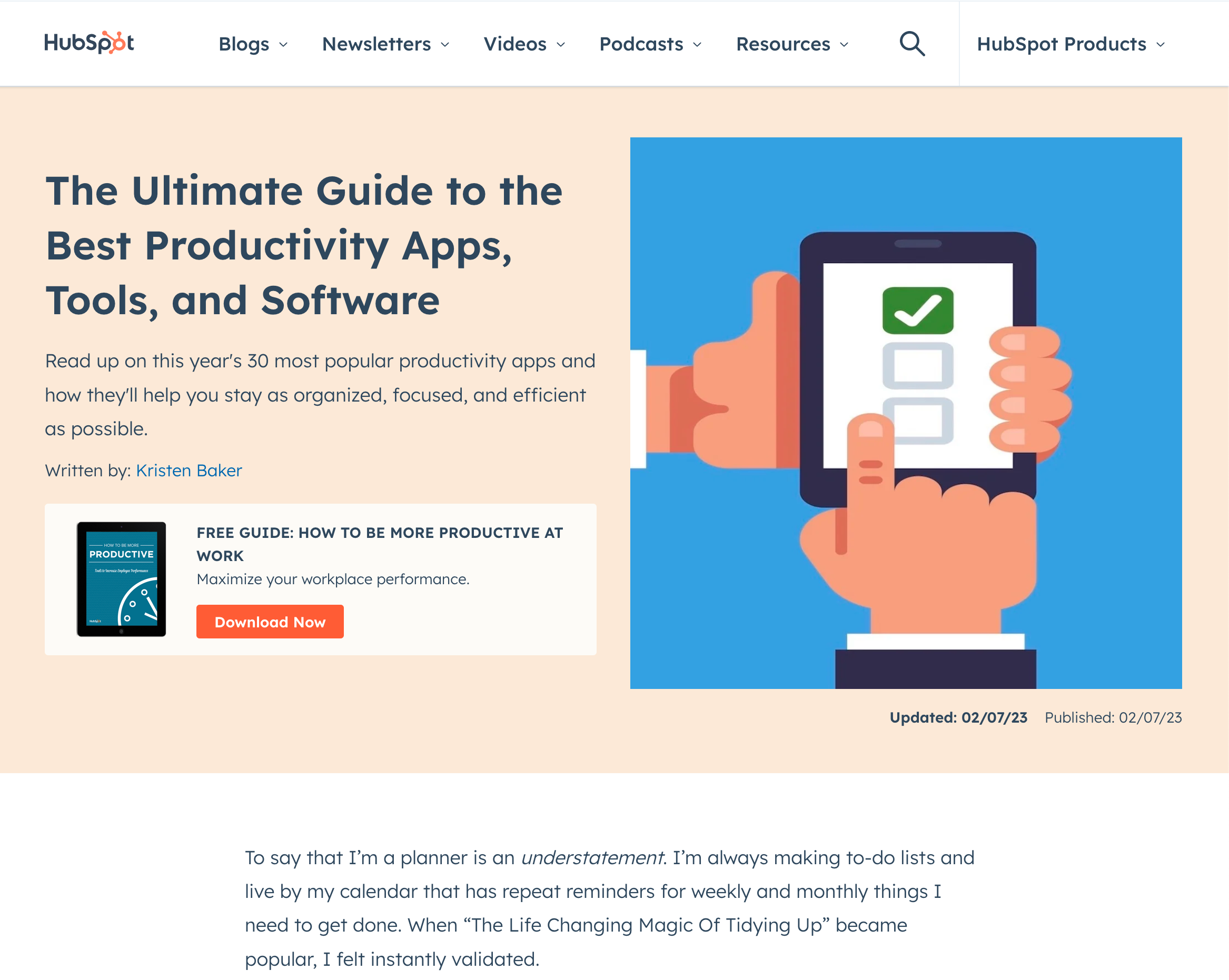
What do I love about it?
The information on this pillar page is very well organized with clear headings. The progress bar that appears at the top of the article when scrolling is a great idea so you know where you are on the long page.
I also like that the pillar page is scannable so I can quickly see what productivity app will be best for my team and me.
Nerdwallet’s credit card 101
If you ever wanted to know everything there is to know about credit cards, reading Nerdwallet's "Credit Card 101" guide is a must.
Type of pillar page: 10x content pillar
Number of internal links: 24
Number of external links: 0
What makes this a pillar page?
The blog post from Nerdwallet is a pillar page because it targets a specific keyword related to credit cards and has many internal links to the topic cluster.
The page gives the reader a broad overview of the topic, and if they want more detailed information, a click on one of the links helps them out.
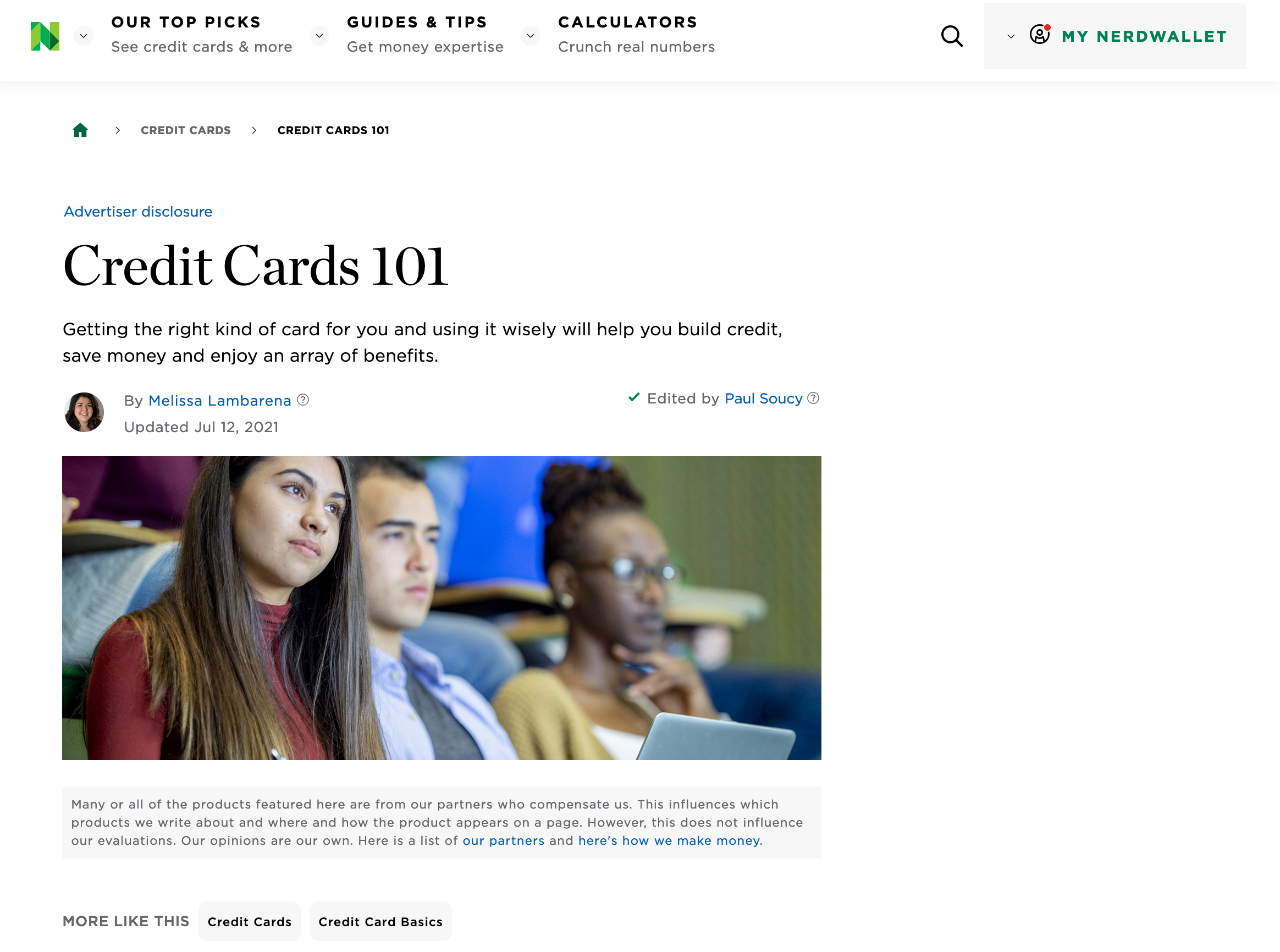
What do I love about it?
The content is very digestible, with short SEO-optimized paragraphs, headings, and bullets. You can also click on the tags before the introduction to read more about credit cards.
I also like the interactive "Find the right type of credit card" quiz, where you answer three questions before getting a recommendation.
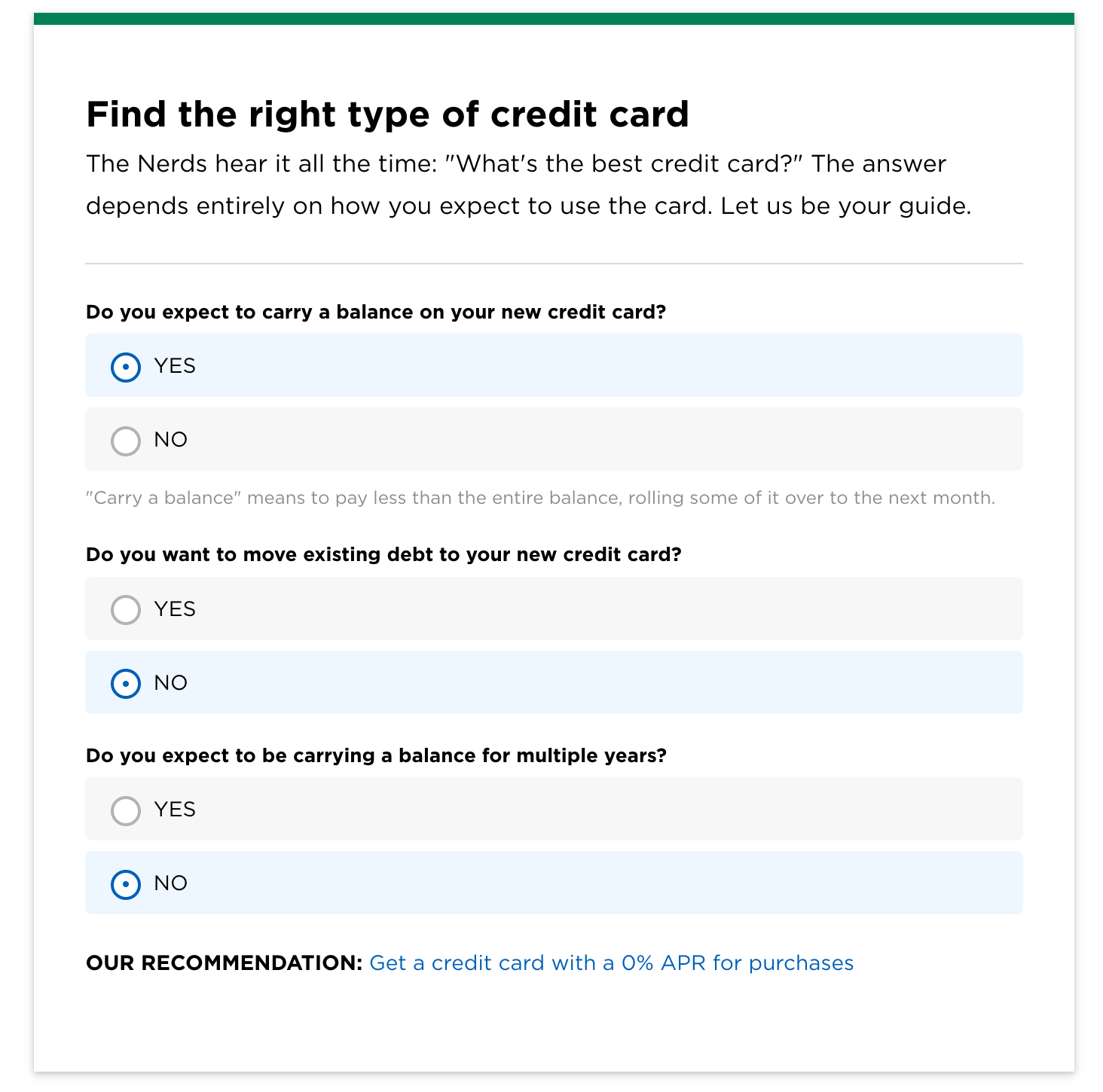
Surfer's keyword research guide
Of course, I just had to include Surfer's own pillar page example on keyword research.
Type of pillar page: How to guide
Number of internal links: 24
Number of external links: 10
What makes this a pillar page?
The keyword research guide is truly a guide if you want to know how to do keyword research for your website or WordPress blog. The pillar page has plenty of examples under each heading, which is really a value-add to the reader.
The article links to other resources on the Surfer site and tools like the SERP Analyzer and Keyword Research Tool to help the reader with their content and keyword strategy.
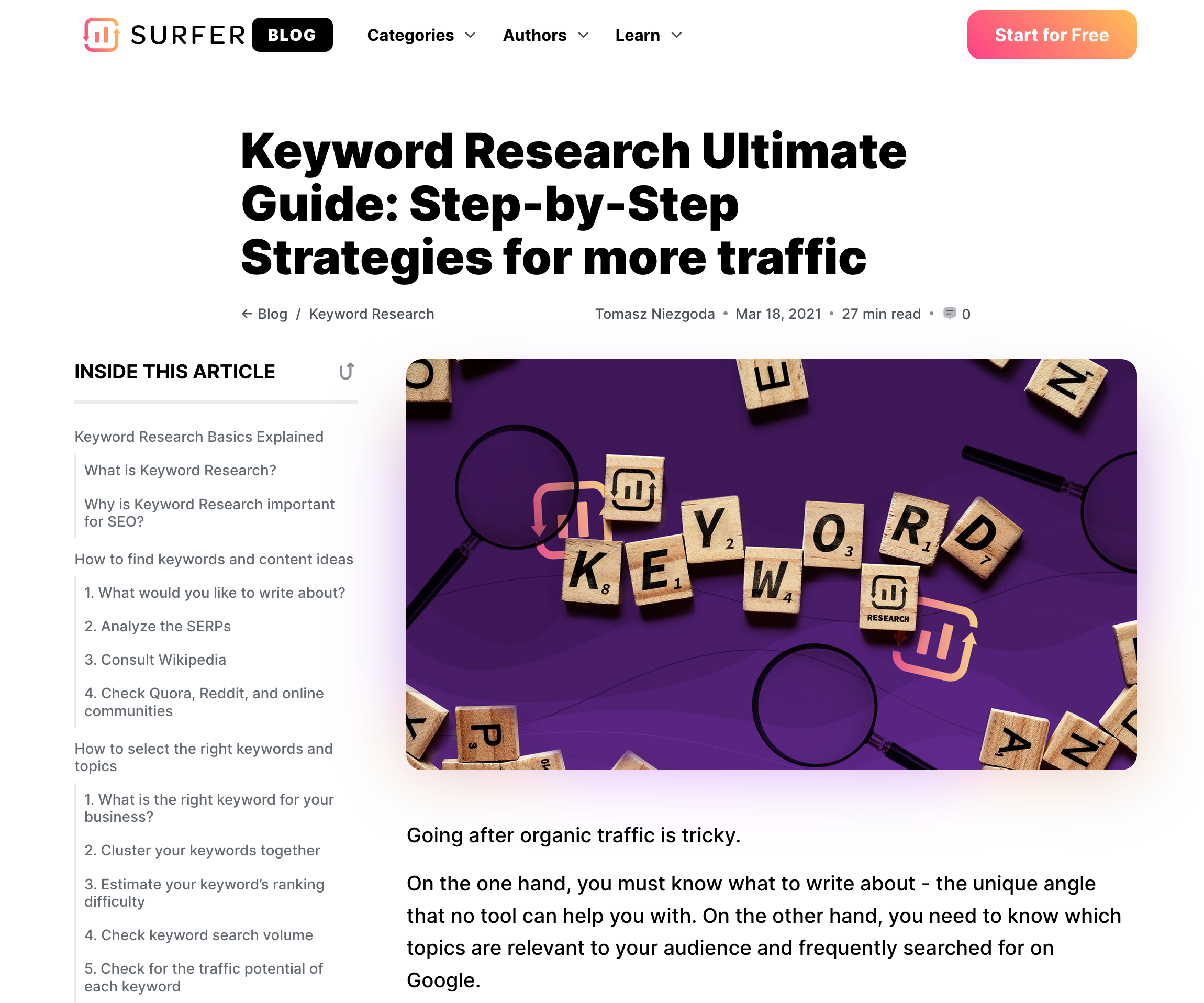
What do I love about it?
I hope I'm not too biased with what I love about this pillar page.
The sticky table with the "return to the topic" button is a win, and Surfer even states that the article will take 27 minutes to read so you know how much time to set aside to digest everything. Of course, you can jump to a relevant section or two if necessary.
I like the studies Tomasz quoted and all the step-by-step mini-guides to add authority, relevance, and expertise to the topic. The addition of personality makes this a great pillar page example and read.
Drift’s chatbot guide
You will be well-educated about chatbots after you dive into Drift's "What Is a Chatbot? The Ultimate Guide."
Type of pillar page: What Is X? Guide
Number of internal links: 28
Number of external links: 1
What makes this a pillar page?
The chatbot guide is a great resource pillar page for readers seeking information about the topic. Drift's pillar article gives a high-level rundown of chatbots, and should the reader want to dig deeper, they can simply follow one of the many links to other related blog articles.
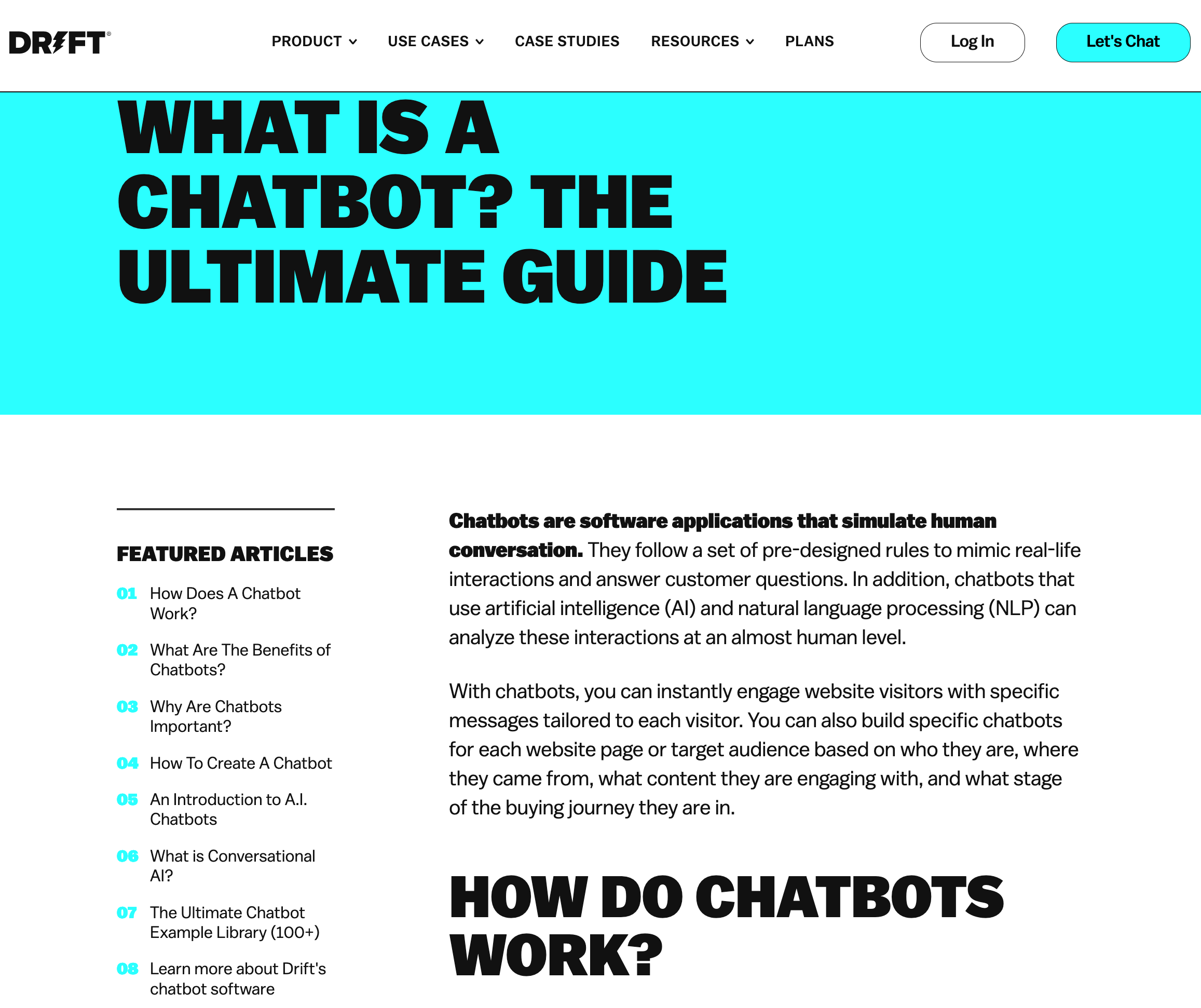
What do I love about it?
This is one of the great pillar page examples because Drift utilized the webpage well with the sticky table, lots of headings, bullets, graphs, and videos to showcase chatbot examples.
It's a more interactive pillar article because of the videos. Since people watch an average of 17 hours of video content and 91% of people say they want to see more online videos, according to Wyzowl State of Video Marketing Report, this should be a key content marketing strategy when you create pillar pages.
Similarweb’s Amazon SEO guide
Amazon is an e-commerce search engine, so it makes sense that you need SEO strategies for your product and brand pages to rank well, boost sales, and more.
According to a report by Smart Insights, nearly 60% of internet users purchased a product or service online, while Amazon reports that it sells around 4,000 items per minute in the U.S. And with almost 2 million small and medium-sized businesses selling on Amazon's platform, competition is fierce, so you gotta do what you gotta do to stand out.
Thus, one of the great pillar page examples is Similarweb's Amazon SEO guide.
Type of pillar page: 10x content guide
Number of internal links: 36
Number of external links: 14
What makes this a pillar page?
Firstly, the Amazon SEO guide is a pillar page because it gives the reader a comprehensive overview of the topic with info on Amazon ranking factors, best practices in the form of actionable tips, and more.
Secondly, the content sections are accessible with a table of contents, clear headings, bullet lists, and images that add value for the reader. Thirdly, the internal navigation on the page works because the reader can access more detailed information.
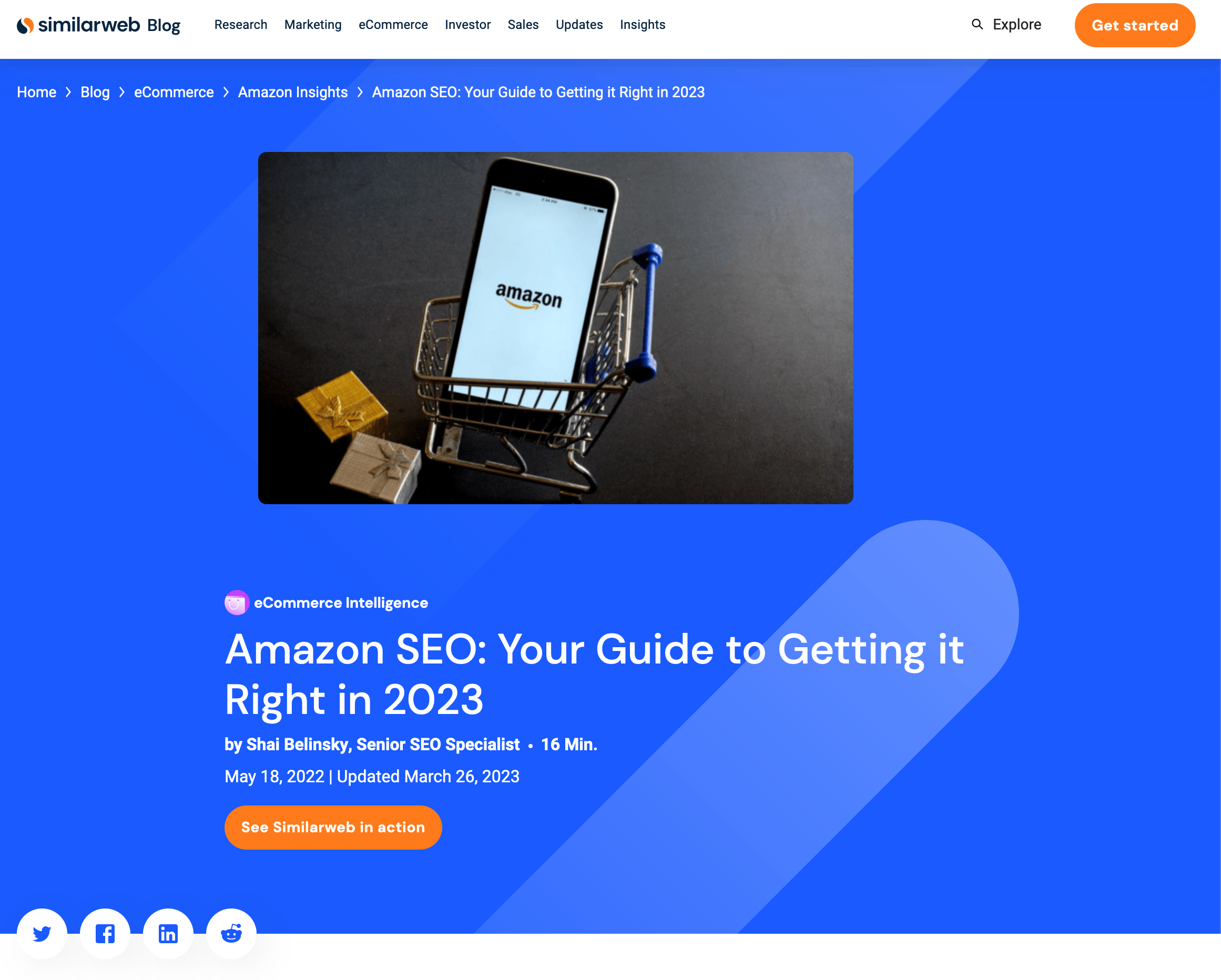
What do I love about it?
The guide is very detailed, and if I were a newbie seller on Amazon, I could focus on this pillar article to get the most essential information and get started on my own Amazon SEO strategy.
The guide also features social media buttons, so you can share the guide with others. And like the examples of other pillar pages, this one looks professional, trustworthy, and authoritative.
Stripe’s team structure guide
If you ever want to know how to set up the best team for a finance startup, Stripe's team structure guide can help. As a business owner, whether you run a large or small company, the team you pick has a significant impact on your success.
Type of pillar page: Guide
Number of internal links: 1
Number of external links: 5
What makes this a pillar page?
With only one internal link, can Stripe's article really be a pillar page? It certainly looks different in comparison to the others I discussed. Yet, it is a pillar article because it offers hiring managers and business owners an overview of the topic (building a finance team for a startup company).
With the tagline stating that you can "successfully create a finance function for your growing startup," readers will feel like they can put a team together with all the tips and tricks and the case study the article offers.
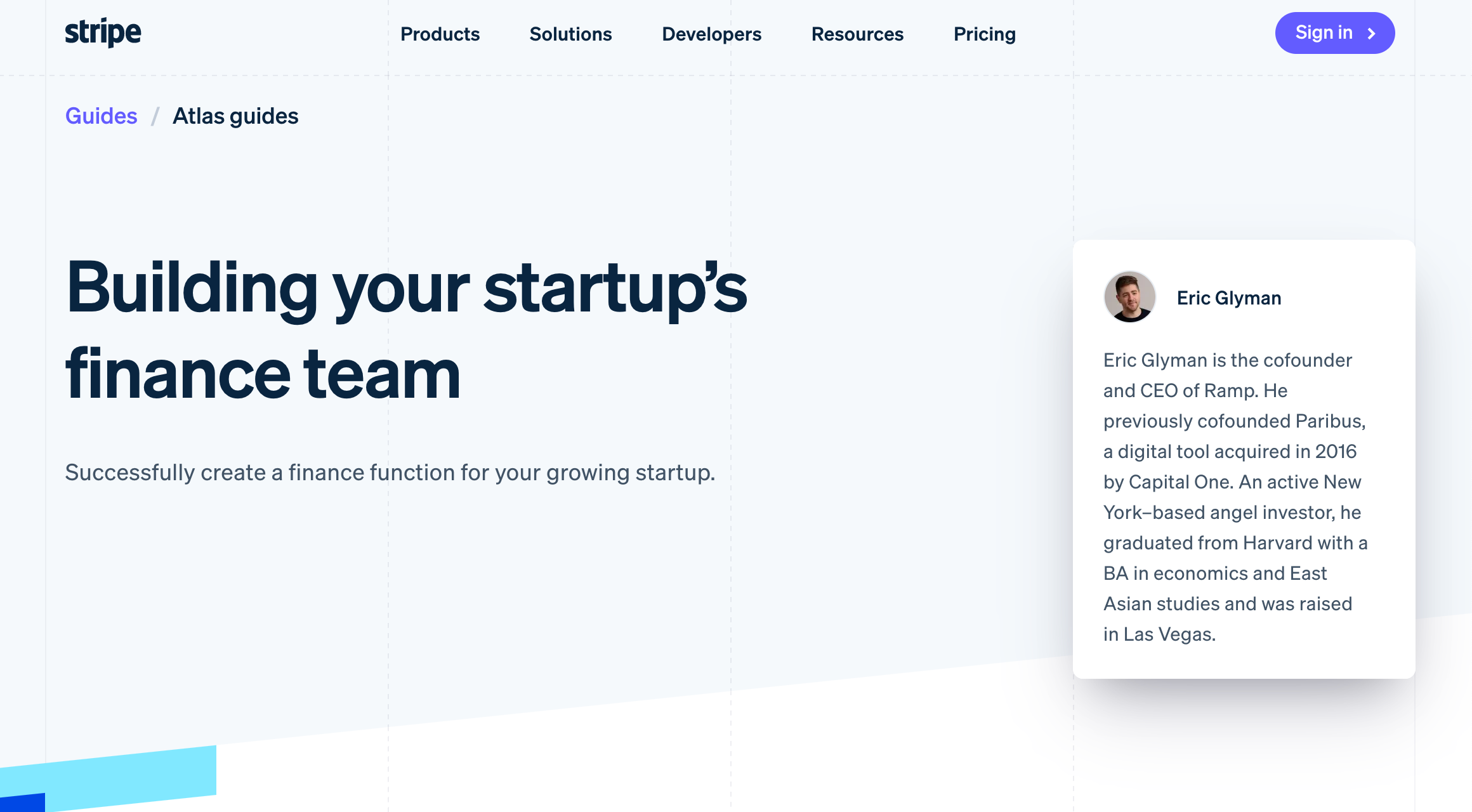
What do I love about it?
This is a page pillar article where the writer's name is front and center, so this lends an extra air of authority, in addition to Stripe already being a trustworthy source of information.
The floating table of contents also expands with the subheadings as you scroll the article, which is pretty cool.
I also like the inclusion of the case study, which can help the reader when they need to hire a finance team.
Key takeaways
- Having a pillar and cluster page strategy for your website helps you better share your experience and expertise with your readers, enabling you to establish topical authority.
- Because pillar pages are part of your content strategy, Google ranks your web pages higher in the search engine results, which boosts traffic and qualified leads for your content or sales funnel.
- Pillar pages are landing pages that keep your content organized and improve your site structure and internal linking strategy as you link to various topic clusters, keeping people on your site longer.
- Various pillar page examples exist to help motivate you to create your own.
- Some of the best pillar articles include our own keyword research guide, Drip's email marketing guide, Investopedia's stock market for teens, and Nerdwallet's credit card 101 guide.
Conclusion
Creating pillar pages is essential to boost your site structure and ranking since you'll meet E-E-A-T guidelines and showcase your experience, expertise, authority, and trustworthiness on a topic.
With these 9 examples of pillar pages, you can find your inspiration and benefit from a pillar page strategy.
What other brilliant pillar page examples are out there? Are you the mastermind behind one? Please share with us in the comments below.

